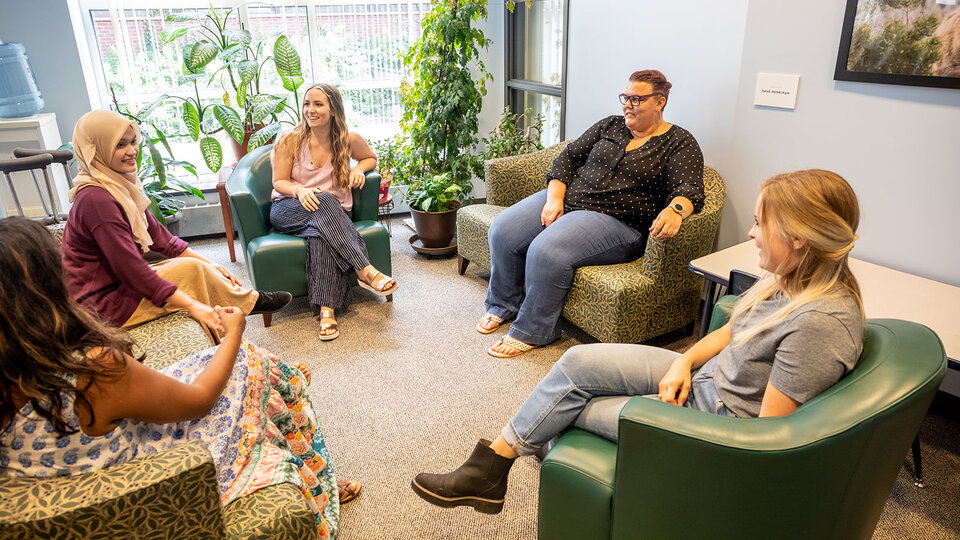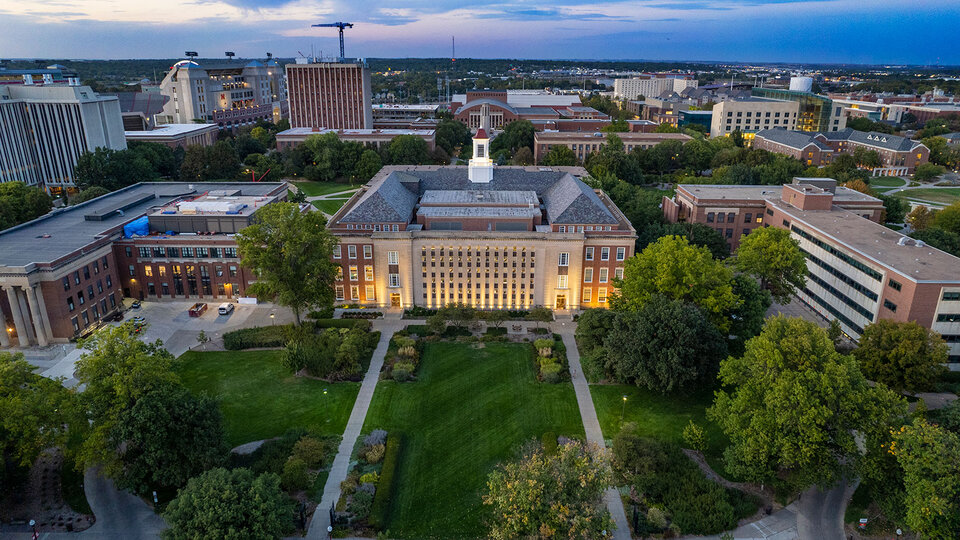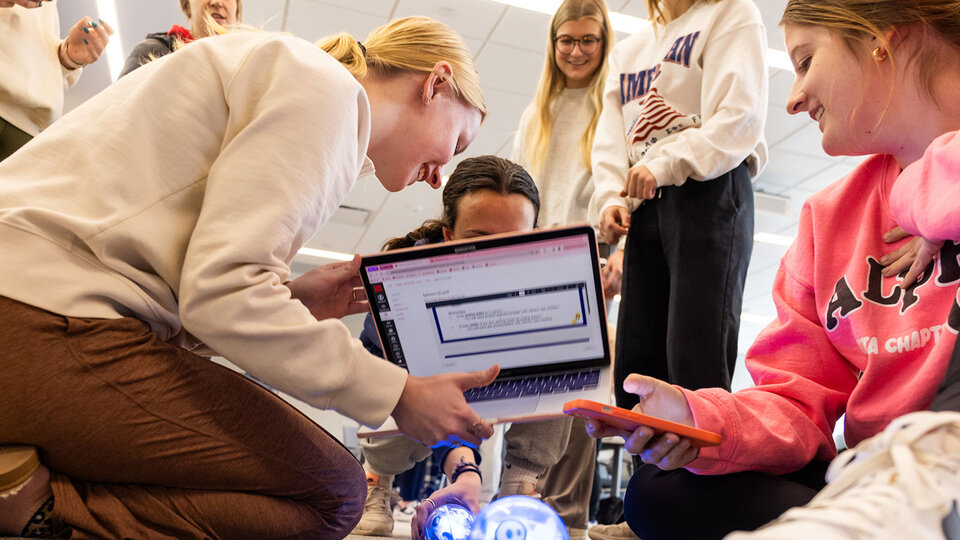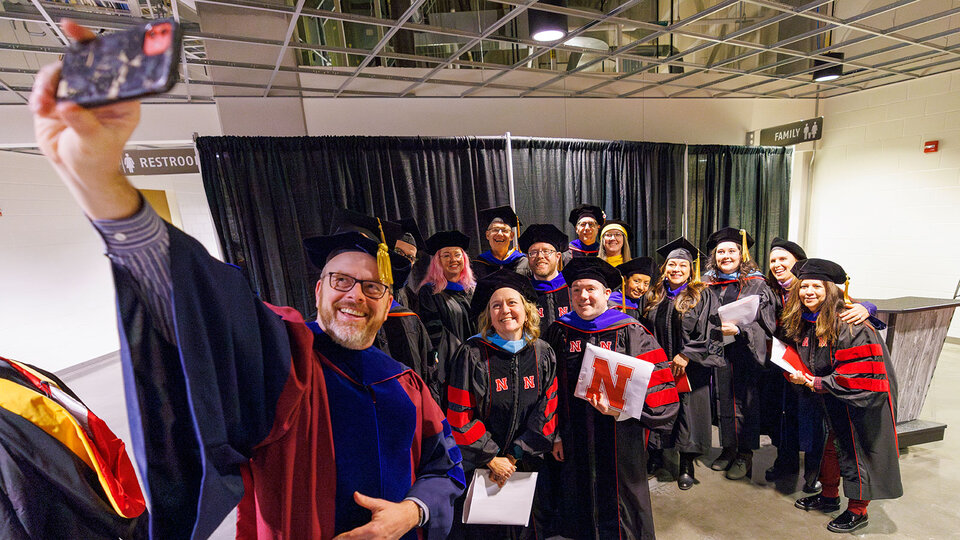The University of Nebraska-Lincoln seeks an innovative and inspiring academic leader to serve as the next Dean of the College of Education and Human Sciences.
This is a unique and compelling opportunity to join one of the nation’s leading public land-grant research institutions at a time of strategic investment across UNL and the College’s academic programs, infrastructure, research, and community engagement. The next Dean will lead a diverse, collaborative, and collegial community of exceptional faculty, staff, and students poised to reveal and promote its strengths as the next leader charts a bold vision together. The incoming Dean will champion the College’s culture of rigorous inquiry and innovation in pursuit of meaningful impact and will position the College to play a central role within the University’s strategic vision. Headquartered in the newly constructed Carolyn Pope Edwards Hall, this one-of-a-kind college comprised of seven academic departments, with strong and important collaboration with the Institute for Agriculture and Natural Resources, is dedicated to enhancing the lives of individuals, families, schools and communities and strengthening the relationships among them.
Reporting to the Executive Vice Chancellor, the College’s next Dean will join UNL at a pivotal moment, as the University is pursuing an aggressive agenda that will strengthen its position as a nationally preeminent and distinctive Big Ten university. Specific goals of this agenda include increasing enrollment; growing research expenditures; enhancing student retention and graduation rates; increasing the number of tenured and tenure-track faculty; prioritizing inclusive excellence and belonging; and increasing the number of faculty receiving national recognition and awards for their teaching, research, and creative activity. In service of this agenda, the incoming Dean will have the opportunity to harness the College’s rich history and collaborative culture, with a unique vantage point to shape and guide the College of Education and Human Sciences and support UNL’s future and continued successes.
University of Nebraska-Lincoln
IN OUR GRIT, OUR GLORY
We are Nebraska.
We believe in the power of every person. We don't rest on our strengths—we stretch them. Sweat them. Combine them. Growing flexible, nimble and strong minds. That's how we do big things.
FOR MORE THAN 150 YEARS, A LEADER IN HIGHER EDUCATION
Founded as a land-grant institution in 1869, the University of Nebraska–Lincoln is the flagship institution among the four universities of the University of Nebraska System and serves as both the land-grant and comprehensive public research university of the state of Nebraska. UNL ranks among the world’s leading universities and is the state’s primary intellectual center through its missions of teaching, research, and service. The university’s land-grant mission creates a state-wide responsibility to serve the needs of Nebraska and its citizens, and through Nebraska Extension and its partnerships with federal, state, and county agencies, the university has an outreach program in each county in the state.
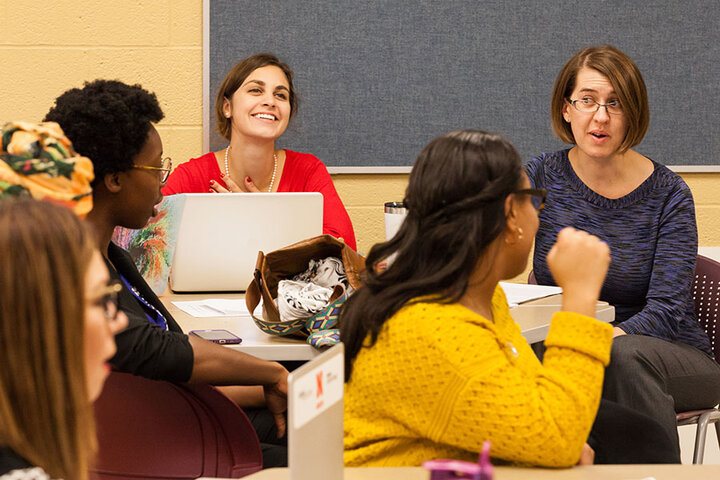
NL is designated in the Carnegie Classification system as an R1 research university with very high research activity, is one of the nation’s leading public teaching institutions, and is a research leader with a wide array of grant-funded projects aimed at broadening knowledge in the sciences and humanities. By connecting everything it does to its research, scholarship, and creative activity, the university ensures these innovations shape the education provided to its undergraduate, graduate, and professional students. UNL is also among nearly 400 U.S. universities that have received a Community Engagement classification from the Carnegie Foundation for its wide-ranging outreach efforts across the state.
UNL is a member of the Big Ten Conference and the Big Ten Academic Allianceand is accredited by the Higher Learning Commission. UNL completed a successful reaccreditation visit in 2017, followed by a successful year four assurance review in 2021.
UNL's nine colleges — Architecture, Agricultural Sciences and Natural Resources, Arts and Sciences, Business, Education and Human Sciences, Engineering, Hixson-Lied Fine and Performing Arts, Journalism and Mass Communications, and Law — provide exceptional breadth and depth of opportunity in the sciences, liberal arts, and professional disciplines, with strong student enrollment, student diversity, and sponsored research funding. Experiential learning is highly valued at UNL, and beginning with the 2022-23 academic year, it is a requirement for graduation. Every college offers a range of experiential opportunities for students.
While a research-intensive institution, UNL faculty possess an extraordinary and primary focus on educational excellence. The university offers more than 100 undergraduate majors and over 170 graduate degree and certificate programs in its nine academic colleges. UNL holds access to high-quality education as a principal part of its mission. In congruence with this value, the university enrolled 23,992 students from all 50 states pursuing undergraduate, graduate, and professional degrees in Fall of 2024. Undergraduate enrollment within the College of Education and Human Sciences was up 3.4% to 2,373. UNL also boasts a high student retention rate with 86% of first-year students in 2023 returning for their sophomore year.
Undergraduates learn from faculty who create new knowledge, who are leading scientists, artists, and scholars, and who care deeply about students’ success. The general education curriculum, Achievement-Centered Education, is built on student learning outcomes that answer the fundamental question: “What should all undergraduate students — irrespective of their majors and career aspirations — know or be able to do upon graduation?” UNL also provides attractive professional and graduate education offerings and aims to foster a meaningful and excellent graduate student experience through its individual development plans, Preparing Future Faculty program, and Teaching Development program.
UNL is home to a distinguished standing faculty of over 1,800 engaged in groundbreaking research and professional practice that crosses disciplinary and professional boundaries. In addition to its regional and national collaborations, the university brings international dimensions to its programs through the faculty’s global engagement, a student body that includes students from throughout the world, exchange agreements with other universities abroad, and the incorporation of international components in a variety of courses and curricula.

For the seventh year, the University of Nebraska System ranked among the world’s top 100 in earning U.S. patents after earning 46 U.S. utility patents in 2023. NUtech Ventures, UNL’s technology commercialization arm, brought in $5.7 million in licensing revenue in the fiscal year 2023 Beginning with fiscal year 2023, the National Science Foundation’s Higher Education Research and Development Survey combines the federally-funded research expenditures of UNL, the University of Nebraska Medical Center, and the NU System Office of the President to align more closely with the reporting of other Big Ten institutions and the Association of American Universities. At the end of fiscal year 2023, combined research growth reached $617 million, a 53% increase over the past 10 years.
In Fall 2024, U.S. News & World Report ranked UNL No. 81 among all public institutions in the United States and No. 152 nationally. It also gave a strong ranking of No. 107 in Best Value Schools, affirming UNL's success in its commitment to the land-grant mission: access to an affordable college education for all qualified students. U.S. News & World Report also ranked UNL No. 108 in veteran support, and the Military Times listed UNL No. 22 on its list of 325 colleges and universities and first among the Big Ten. In the 2024 Forbes ranking of America’s Best Large Employers, the university is No. 2 in Nebraska and No. 154 nationally. In the education sector, UNL is No. 1 statewide and No. 18 overall. UNL, also known as "Big Red" in Division I sports, lifts Nebraska's visibility nationally and allows the university to compete both athletically and academically. Nebraska athletes have earned more Academic All-American awards and NCAA Top Eight Awards than any other D1 institution. UNL is regularly named a top research institution whose students are awarded Fulbright scholarships, and UNL undergraduates consistently succeed in prestigious national scholarship competitions.
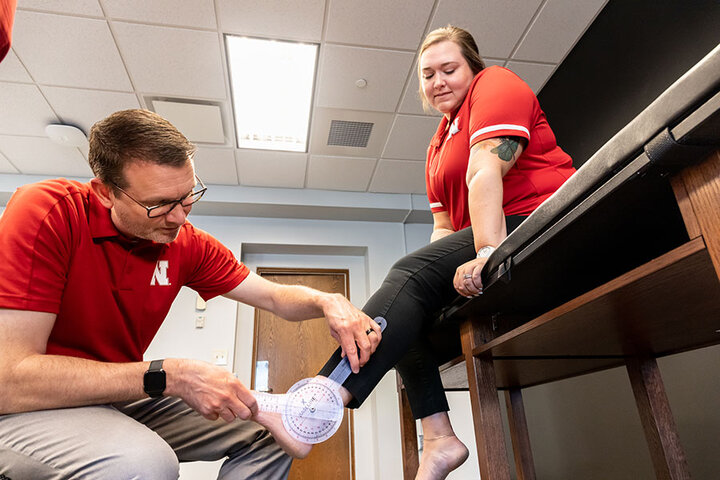
UNL has invested $1 billion over the last ten years in significant academic and research facilities, including new construction and renovations. Plans for additional projects are underway. In addition, the University of Nebraska Foundation recently launched "Only in Nebraska," an ambitious capital campaign to raise over $3 billion for the University of Nebraska System. While the campaign has three key areas, the top priority is a relentless focus on student access and success supporting scholarships, experiential learning, collaborative research initiatives, global experiences, and graduate and professional student fellowships. Support for endowed faculty chairs and professorships will help UNL continue to recruit and retain faculty who are a source of intellectual capital for the state as well as the inspiration and teachers of the next generation of students.
Transformational research and innovation are the third key area, providing support for research and innovation that bring solutions and discoveries to the state and improve outcomes for Nebraskans. UNL firmly believes that the campaign’s success will be possible with the strong support and appreciation from the citizens of the state of Nebraska. Nebraskans value higher education, which is the key to a strong workforce and vibrant economy. A 2021 Tripp Umbach Economic Contribution Report found the NU System generates $9 for every $1 the state invests. The report also found UNL's direct annual overall economic impact across the state of Nebraska was $2.9 billion, including directly or indirectly supporting 23,448 jobs across the state.
The College of Education and Human Sciences brings the power of higher education to bear on the challenges individuals, families, schools and communities face every day. That power manifests itself through the teaching, research, outreach, and extension of talented faculty, staff and students and is demonstrated through the contributions the alumni make to the communities in which they live. The land-grant mission of the university is strongly valued and upheld within the college.
The College of Education and Human Sciences is a one-of-a-kind college comprised of seven academic departments that cross a wide range of content areas all focused on improving people's lives. These include:
- Child, Youth and Family Studies;
- Educational Administration;
- Educational Psychology;
- Nutrition and Health Sciences;
- Special Education and Communication Disorders;
- Teaching, Learning and Teacher Education;
- Textiles, Merchandising and Fashion Design.
The interrelated and multidisciplinary nature of the college promotes innovative ways of looking at issues, asking questions and seeking solutions to complex problems. The college has a strong, collaborative relationship with the Institute of Agriculture and Natural Resources, and many faculty embrace the ideals of translational research and impact on the communities through extension.
For instance, the teaching and research collaborations with Nebraska Extension place the college’s engagement efforts in all 93 counties in the state.
Further, numerous partnerships extend the College of Education and Human Sciences’ mission beyond campus, through centers such as the Barkley Speech Language and Hearing Clinic, the Couple and Family Clinic, the Buros Center for Testing, the Kit and Dick Schmoker Reading Center, Osher Lifelong Learning Institute, the Nebraska Prevention Center for Alcohol and Drug Abuse, the Nutrition Education Program, the Counseling and School Psychology Clinic, the Robert Hillestad Textiles Gallery, the Nebraska Academy for Methodology, Analytics and Psychometrics, the Nebraska Academy for Early Childhood Research, the Early Development and Learning Lab, and the Ruth Staples Child Development Laboratory.

Crossing state and national borders is also a focus of the college. Education abroad opportunities have grown significantly in recent years. The people-oriented focus of the college gives students, faculty and alumni, a world of opportunities in which to achieve their goals and dreams. High academic standards support the knowledge and skills students, faculty and staff members rely on to pursue those dreams effectively.
The college works closely with 10 accrediting bodies that monitor selected programs and assure standards of quality. Several of the college programs have achieved a national reputation and high rankings by U.S. News & World Report and other ranking organizations. These programs include teacher preparation programs, educational administration, speech-language pathology and audiology. The highly successful Nebraska Center for Research on Children, Youth, Families and Schools and the Nebraska Center for the Prevention of Obesity Diseases through Dietary Molecules, an $11.3 million Center of Biomedical Research Excellence funded by the National Institutes of Health, are evidence of the college’s research being nationally visible.
The College of Education and Human Sciences was formed in 2003, by combining Teachers College and the College of Human Resources and Family Sciences. In the more than 20 years since its founding, the newly imagined college has successfully merged and found its own identity. Approximately 2,300 undergraduate students, 850 master's and doctoral students, and more than 380 faculty and staff members are part of the college community.
Although interests vary widely, the unifying commitment to address the physical, intellectual, social and economic well-being of individuals, families, schools and communities as they function in Nebraska and throughout the world guides the teaching, research, extension, and service of the college.
The college recently completed construction on Carolyn Pope Edwards Hall, a 126,590-square-foot, four-story facility, features classrooms, meeting spaces, offices, labs, a 380-seat auditorium and a link directly to Teachers College Hall and Henzlik Hall. The facility is the new home for the CEHS dean’s office; the Department of Child, Youth and Family Studies; the Department of Teaching, Learning and Teacher Education; the Nebraska Center for Research on Children, Youth, Families and Schools; and the Nutrition and Health Sciences Human Performance and Body Composition Lab.
Visit cehs.unl.edu for additional information about the College of Education and Human Sciences.
The Dean reports directly to the Executive Vice Chancellor and Chief Academic Officer and serves as the chief academic and administrative officer of the College of Education and Human Sciences. The Dean will join a cohort of deans and campus leaders who are collaborative, supportive and committed. The Dean will engage with college leadership and will have responsibility for the strategic, programmatic, financial, fundraising, and management operations that support the mission and vision of the College of Education and Human Sciences and its role within the university and state.
The incoming Dean will:
- Have the opportunity to build upon the College's strategic plan and its implementation in collaboration with faculty, staff, and students;
- Further the development of a relevant and distinctive identity for the multiple disciplines represented throughout the College;
- Serve as a public voice to develop the reputation of the College externally on national and international stages;
- Along with the department chairs, assure the continued prominence of the faculty by prioritizing the recruitment and retention of innovative and impactful faculty at all levels;
- Cultivate academic programs that demonstrate relevance, impact, innovation, and sustainability;
- Steward the relationship and strengthen the connections with Institute of Agriculture and Natural Resources (IANR), Agricultural Research Division (ARD), Extension, and their leadership;
- Work to fully realize and enact the College's and University's commitment to community and belonging, ensuring that all individuals and interactions matter;
- Seek out and continue valuable collaborations with other academic units and partners;
- Promote and support a strong and diverse research agenda including attracting external funding;
- Champion and support multiple forms of scholarship, research, teaching, service, clinical work, and extension;
- Assure that the College continues to serve its students with academic programs of the highest quality and effectiveness, promoting practices for student success, retention, graduation and placement;
- Support the recruitment and retention of a high-quality staff;
- Engage alumni and other external supporters to advance the mission of the College;
- Take a leading role in attracting interested donors to support the College’s mission;
- Foster the development of an effective, ongoing leadership infrastructure throughout the College; and
- Continue an upward trajectory of enrollment in the College.
Successful candidates will have an outstanding academic record of impactful scholarship, teaching, and engagement; an abiding commitment to excellence of undergraduate and graduate education; significant record of success as a leader whose credibility, communication skills, and consultative management style can energize a dynamic, complex academic unit; a demonstrated commitment to creating a welcoming and inclusive environment that fosters community and belonging; the ability to collaborate and partner effectively with a broad range of constituencies both across the University and with community partners and external audiences; demonstrate the ability to lead sophisticated and effective development and fundraising activities; and the skill to develop a purposeful and compelling strategy that will distinguish the College of Education and Human Sciences as a leader in the state, as well as a valuable regional, national and international resource. The next leader must also have and continue to demonstrate the highest level of integrity. Candidates must hold an earned doctorate, with scholarly or research accomplishments commensurate with the rank of full professor in their home tenure department within the College.
ADDITIONAL ATTRIBUTES
A highly qualified candidate will also:
- Embody the role of advocate and champion for the College within the University setting and in the broader communities statewide and nationally;
- Possess and model a systems-thinking approach that focuses on integrative solutions to complex problems;
- Take bold, courageous risks to achieve excellence;
- Cultivate a vision for the future by being unafraid to propose new ideas and think beyond the existing structure and design of the College;
- Demonstrate comfort with and knowledge of the range of disciplines and scholarship represented through the College;
- Model an ethic of care and cultural consciousness for all college constituents
- Demonstrate experience fostering and supporting a national and/or international reputation in diverse forms of scholarship, including interdisciplinary or community-engaged work, among others;
- Listen actively and model feedback to create more transparency, awareness, and understanding of decisions and outcomes throughout the College;
- Exhibit an authentic curiosity;
- Be energized to work in a complex organization and embrace the multifaceted needs of the College community including students, staff, all faculty, and external partners; and
- Embrace the challenges and unknowns of higher education today including the enrollment landscape and bring meaningful solutions for growing the reach and impact of the College.
How to Apply
We will begin reviewing candidates immediately and will continue until the position is filled. Priority consideration will be given to those materials received by December 30, 2024. Applications should consist of a letter summarizing motivation, relevant leadership experience, and qualifications and a detailed curriculum vitae.
To ensure full consideration, inquiries, nominations and all applications (PDF files preferred) should be submitted, in confidence, to:
ZRG Partners
College of Education and Human Sciences Dean Search
UNL-CEHSDean@zrgpartners.com
The University of Nebraska – Lincoln is committed to creating a diverse and inclusive work and learning environment free from discrimination and harassment. UNL is dedicated to creating an environment where everyone feels valued, respected, and included. UNL complies with all local, state, and federal laws prohibiting discrimination, including Title IX, which prohibits discrimination on the basis of sex.
As an EO/AA Employer, the University of Nebraska considers qualified applicants for employment without regard to race, color, ethnicity, national origin, sex, pregnancy, sexual orientation, gender identity, religion, disability, age, genetic information, veteran status, marital status, and/or political affiliation. See unl.edu/equity/notice-nondiscrimination.
